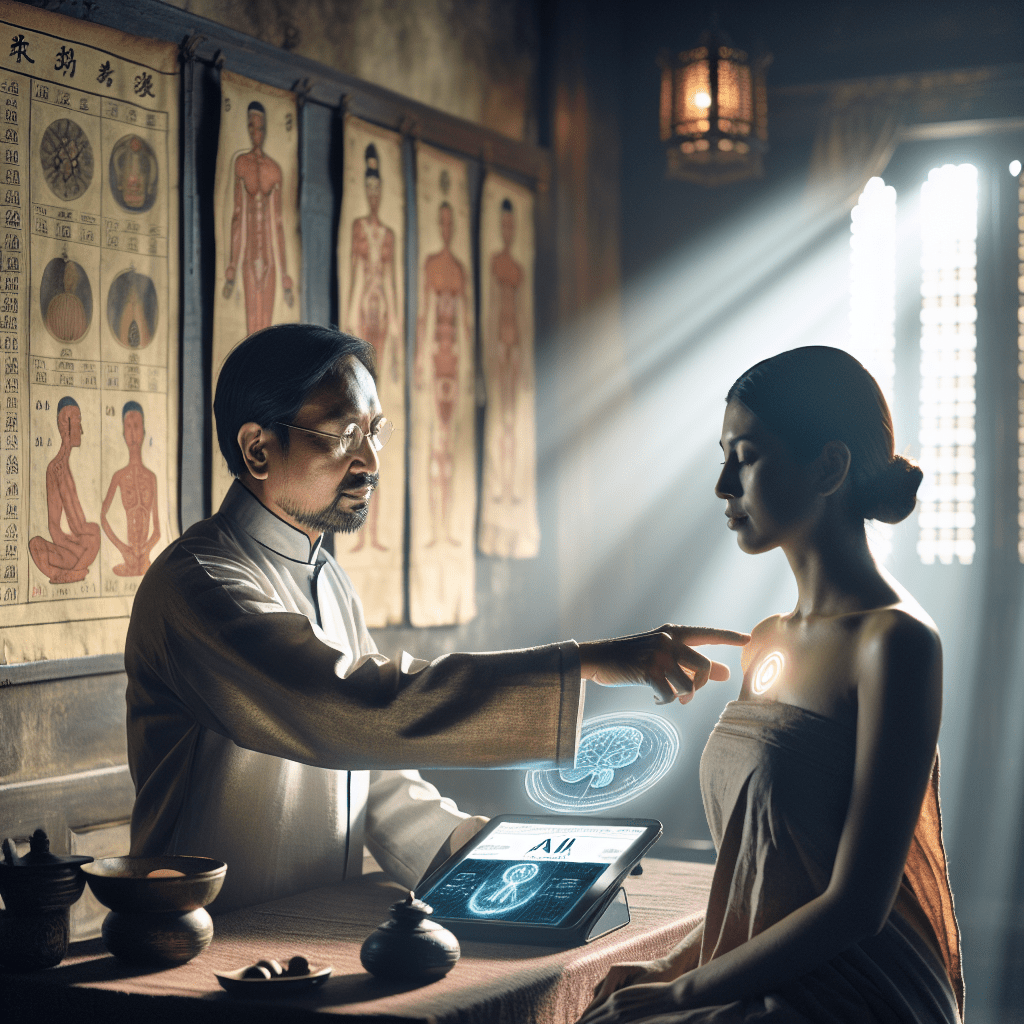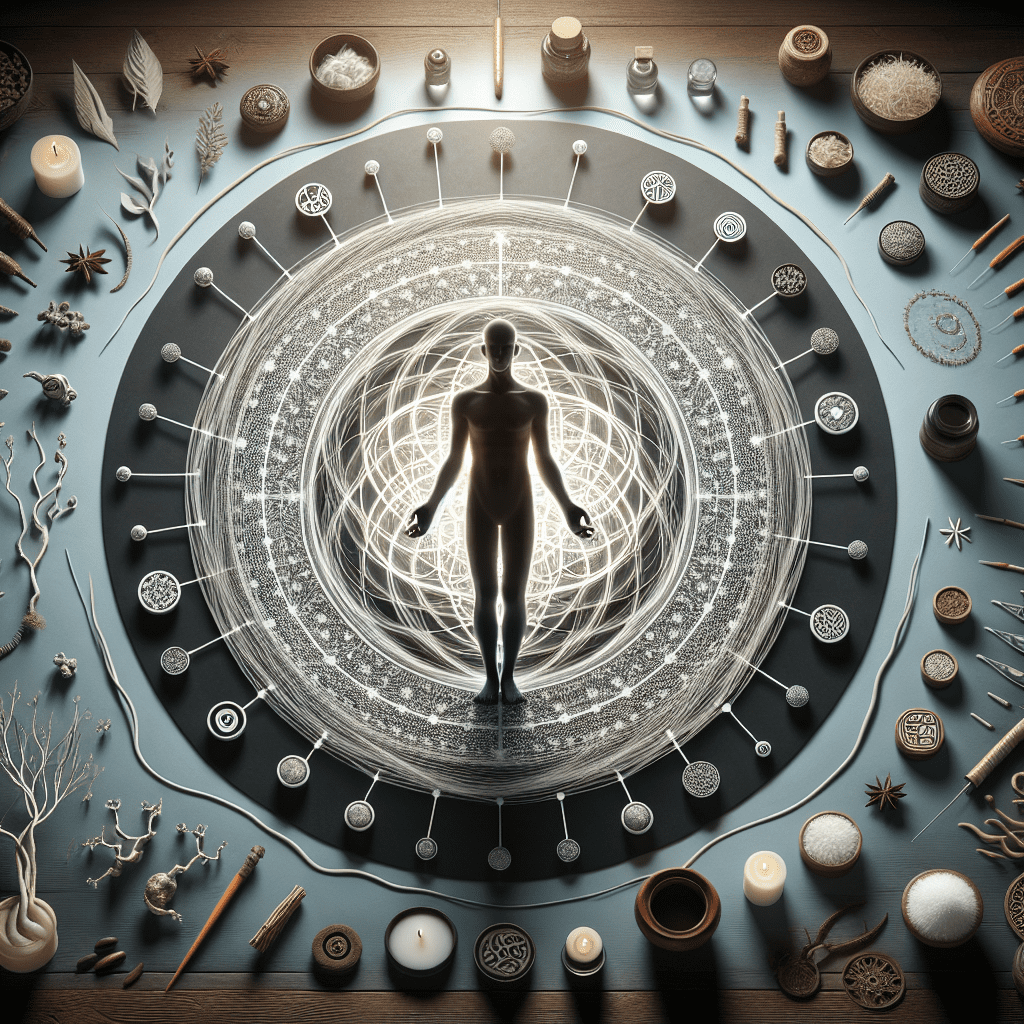At the intersection of ancient wisdom and cutting-edge technology, a healthcare revolution is quietly unfolding—one that could fundamentally transform how we understand and address health issues before they become problems.
In the bustling intersection of technology and traditional healing practices, a fascinating phenomenon is taking shape. Artificial intelligence, the cutting-edge frontier of modern innovation, is joining hands with Traditional Eastern Medicine, a healing system with roots stretching back thousands of years. This unlikely partnership is revolutionizing how we approach health diagnostics, creating a harmonious blend that honors ancient wisdom while embracing technological advancement.
Imagine a world where your health concerns are identified and addressed before they manifest as physical symptoms. This isn’t science fiction—it’s the emerging reality of AI health diagnostics informed by Eastern medical principles. The convergence of these two knowledge systems offers a balanced approach to well-being that neither could achieve alone.
The allure of this integration lies in its comprehensive nature. While Western medicine excels at treating acute conditions with its analytical approach, Eastern traditions like Traditional Chinese Medicine (TCM) excel at viewing the body as an interconnected system where balance and prevention are paramount. AI serves as the bridge, translating ancient insights into measurable data points that can be tracked, analyzed, and applied with unprecedented precision.
Enhanced Diagnostic Accuracy Through Pattern Recognition
Key Insight: AI’s pattern recognition capabilities are transforming Eastern medicine diagnostics, bringing unprecedented precision to traditional healing methods.
One of the most significant contributions AI brings to Traditional Eastern Medicine is its unparalleled ability to analyze complex data patterns. TCM diagnostics traditionally rely on subtle observations—pulse qualities, tongue appearance, facial features, and symptom constellations—that can take practitioners decades to master. AI systems can now process these multifaceted inputs with remarkable accuracy.
For instance, AI algorithms have demonstrated up to 98% accuracy in diagnosing various conditions by analyzing tongue images alone—a fundamental diagnostic method in Eastern medicine. By processing thousands of historical cases, these systems identify correlations that might escape even experienced practitioners.
This enhanced pattern recognition capability has transformed target screening and drug discovery within the TCM framework. AI can rapidly analyze thousands of herbs and formulations, identifying promising compounds for specific conditions based on their molecular structures and historical usage patterns. The result is a more reliable, evidence-based approach to traditional remedies.
“The integration of AI with TCM improves diagnostic accuracy and facilitates the sharing of expertise among practitioners, ultimately enhancing the treatment experience,” notes a recent study on AI applications in traditional medicine. This sharing of knowledge creates a collective intelligence that raises the standard of care across the board.
For health-conscious individuals seeking natural solutions, this means greater confidence in treatment plans that align with holistic principles. The precision of AI health diagnostics ensures that traditional approaches are applied with greater specificity, resulting in more effective outcomes that honor the body’s natural healing processes.
Personalized Treatment: The Heart of Eastern Medicine Made More Precise
Key Insight: Personalization—a cornerstone of Eastern medicine—reaches new heights when enhanced by AI’s data processing capabilities.
Eastern healing traditions have always emphasized that no two patients are alike, even when presenting with identical symptoms. This personalization principle aligns perfectly with AI’s capacity for individualized analysis.
AI-enhanced systems can now process patient-specific data—including constitution types based on Five Element Theory, medical history, genetic factors, and lifestyle patterns—to create truly personalized treatment protocols. This level of customization was the ideal of traditional practitioners but was limited by human processing capabilities.
For example, EASTCHI AI, a pioneering system that blends Eastern medical wisdom with artificial intelligence, can analyze a user’s constitutional type and provide tailored nutrition plans and lifestyle recommendations based on this assessment. The system continuously learns from user feedback, refining its recommendations to achieve optimal results for each individual.
This personalization extends beyond immediate treatment to long-term health strategies. By analyzing seasonal patterns and their effects on different constitution types, AI can recommend preventive measures specific to each person’s unique vulnerabilities. This approach embodies the Eastern principle that prevention is the highest form of medicine.
The benefits of such customization are profound. Patient outcomes improve when treatments address their specific imbalances rather than general symptoms. Moreover, this approach deepens our understanding of diverse health conditions by identifying patterns across similar constitutional types.
For those drawn to natural, individualized care approaches, AI-enhanced personalization represents the fulfillment of Eastern medicine’s core promise: treatment that respects and works with your unique bodily wisdom rather than imposing standardized solutions.
AI-Assisted Diagnostic Systems: Impressive Accuracy Rates
Key Insight: AI-assisted diagnostic systems are achieving remarkable accuracy rates, providing evidence-based validation for traditional Eastern diagnostic methods.
The practical implementation of AI in traditional diagnostic systems has yielded remarkable results. Machine learning models have demonstrated high accuracy rates in identifying common TCM patterns, often matching or exceeding human practitioners in blind tests.
One notable study showed that AI systems achieved over 90% accuracy in classifying major TCM syndrome types associated with specific conditions. This level of precision helps standardize diagnostic practices that have historically varied between practitioners and schools of thought.
These AI-assisted diagnostic tools serve as valuable decision support systems for practitioners. Rather than replacing human expertise, they enhance it by providing evidence-based validation and suggesting treatment options that might not be immediately apparent. This augmentation aligns perfectly with the philosophy of preemptive care that attracts those interested in preventive wellness strategies.
The diagnostic process itself becomes more thorough when AI is involved. Systems can simultaneously analyze multiple inputs—from pulse waveforms and tongue images to voice patterns and facial features—creating a comprehensive picture of the patient’s condition that might require several specialists in traditional settings.
For example, modern AI applications can identify TCM-specific symptoms such as “fatigue” and “dry mouth” from patient narratives and correlate these with potential imbalance patterns. This capability ensures that subtle yet significant indicators aren’t overlooked in the diagnostic process.
This enhanced accuracy is particularly valuable for those new to Eastern medicine who might be skeptical of its seemingly subjective diagnostic methods. The validation provided by AI systems offers reassurance that these ancient approaches have quantifiable, reproducible results when properly applied.
The Shift Toward Preventive Care: Catching Issues Before They Manifest
Key Insight: The preventive focus of Eastern medicine finds its full expression through AI’s ability to detect subtle imbalances before they manifest as disease.
Perhaps the most revolutionary aspect of AI health diagnostics in the context of Eastern medicine is its potential to truly realize the preventive ideal that has always been central to these traditions.
Traditional Eastern medicine emphasizes that disease begins as subtle energy imbalances long before physical symptoms appear. However, detecting these early imbalances required exceptional skill. AI systems can now identify these precursors with unprecedented sensitivity, enabling truly preventive intervention.
By analyzing trends in biometric data, seasonal influences, lifestyle factors, and constitutional vulnerabilities, AI can predict potential health issues months or even years before they manifest clinically. This early detection allows for gentle corrective measures—dietary adjustments, specific exercises, or herbal supports—rather than aggressive treatments for established conditions.
The economic implications of this shift are substantial. Healthcare costs could be significantly reduced by addressing issues in their formative stages rather than treating full-blown conditions. On a public health level, this approach could transform our medical system from a disease-treatment model to a health-maintenance paradigm.
For individuals committed to sustainable wellness solutions, this preventive capacity represents the most rational approach to healthcare. Rather than waiting for problems to develop and then fighting to reverse them, AI-enhanced preventive care offers the opportunity to maintain balance consistently through informed choices and targeted interventions.
This approach honors the body’s inherent wisdom and self-healing capacity—a cornerstone of Eastern medical philosophy—while providing the specific guidance needed to support these natural processes in our complex modern environment.
The Future of Healthcare: A Harmonious Integration
Key Insight: The future of healthcare lies in harmoniously integrating the best of both worlds—technological advancement and traditional wisdom.
As we look toward the horizon of healthcare evolution, the integration of AI health diagnostics with traditional Eastern medicine represents one of the most promising developments. This partnership offers a comprehensive, integrative health solution that honors both Western technological advancement and Eastern holistic wisdom.
The future may see AI systems that continuously monitor subtle health indicators through wearable technology, offering real-time recommendations based on Eastern medical principles. Imagine receiving an alert that your energy is beginning to stagnate, with simple suggestions for foods, movements, or breathing practices to restore flow before any discomfort arises.
Research institutions are increasingly exploring this frontier. “We invite researchers to submit original articles or reviews that explore how AI technologies are transforming various aspects of TCM,” announced one leading medical journal, signaling the growing academic interest in this integration.
For practitioners, AI tools will likely serve as invaluable learning companions, accelerating the traditionally lengthy training process by providing feedback on diagnostic accuracy and treatment effectiveness. This could help address the shortage of qualified Eastern medicine practitioners while maintaining high standards of care.
For global wellness seekers, this convergence offers the best of both worlds—the precision and evidence-based approach of modern science combined with the holistic, personalized wisdom of Eastern traditions. The result is a healthcare approach that addresses not just symptoms but the whole person in their unique context.
This vision aligns perfectly with HerbalsZen’s philosophy of bridging ancient and modern wisdom. By leveraging technologies like EASTCHI AI, which integrates 2,000-year-old Eastern medical knowledge with cutting-edge artificial intelligence, we’re participating in creating this new healthcare paradigm that honors both innovation and tradition.
The integration of AI health diagnostics with Traditional Eastern Medicine isn’t merely a technological advancement—it’s a philosophical reconciliation. It acknowledges that true healing comes from neither technology alone nor tradition alone, but from their thoughtful integration. It’s a future where your health isn’t just managed when problems arise but optimized continuously through the harmonious application of ancient wisdom and modern capabilities.
In this emerging landscape, we can truly aspire to the highest ideal of both Eastern and Western medical traditions: not merely the absence of disease, but the presence of vibrant wellbeing—predicted, protected, and promoted through the remarkable partnership of AI and ancient healing wisdom.
Experience the future of personalized wellness with AI-enhanced traditional healing approaches—where ancient wisdom meets modern technology to create unprecedented health insights tailored just for you.




